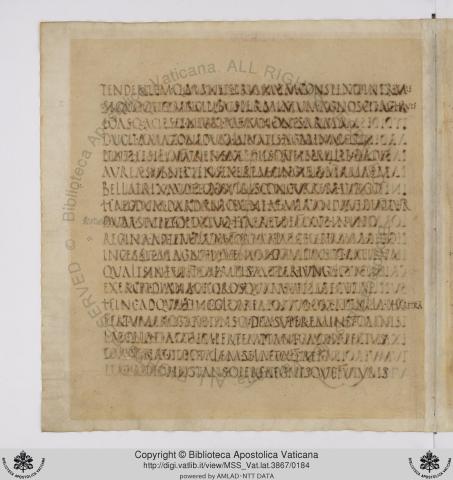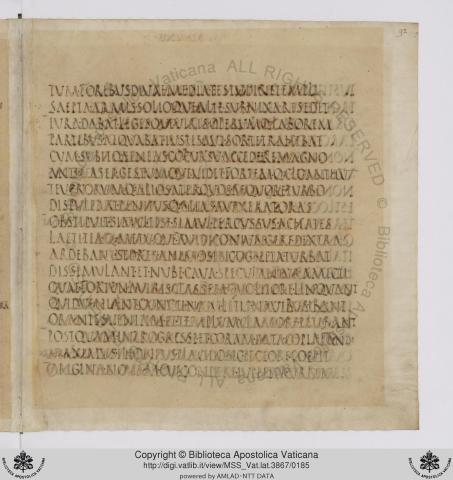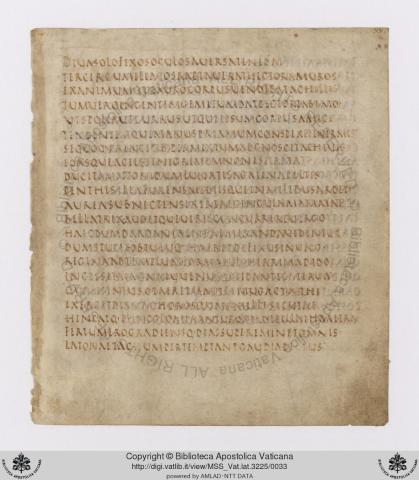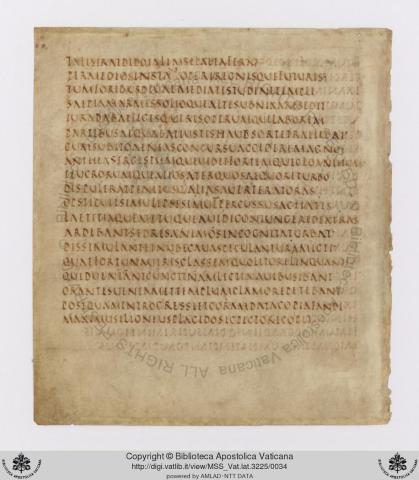Haec dum Dardaniō Aenēae mīranda videntur,
dum stupet obtūtūque haeret dēfīxus in ūnō,495
rēgīna ad templum, fōrmā pulcherrima Dīdō,
incessit magnā iuvenum stīpante catervā.
Quālis in Eurōtae rīpīs aut per iuga Cynthī
exercet Dīāna chorōs, quam mīlle secūtae
hinc atque hinc glomerantur Orēades; illa pharetram500
fert umerō gradiēnsque deās superēminet omnēs
(Lātōnae tacitum pertemptant gaudia pectus):
tālis erat Dīdō, tālem sē laeta ferēbat
per mediōs īnstāns operī rēgnīsque futūrīs.
Tum foribus dīvae, mediā testūdine templī,505
saepta armīs soliōque altē subnīxa resēdit.
Iūra dabat lēgēsque virīs, operumque labōrem
partibus aequābat iūstīs aut sorte trahēbat:
cum subitō Aenēās concursū accēdere magnō
Anthea Sergestumque videt fortemque Cloanthum510
Teucrōrumque aliōs, āter quōs aequore turbō
dispulerat penitusque aliās āvexerat ōrās.
Obstipuit simul ipse, simul percussus Achātēs
laetitiāque metūque; avidī coniungere dextrās
ārdēbant, sed rēs animōs incognita turbat.515
Dissimulant et nūbe cavā speculantur amictī
quae fortūna virīs, classem quō lītore linquant,
quid veniant; cūnctīs nam lēctī nāvibus ībant
ōrantēs veniam et templum clāmōre petēbant.
notes
Manuscripts: M 494, 495-519 | P 494-506, 507-519 | R 494-504, 505-519 | F 494-502, 503- 519
Dido, attended by a numerous retinue, enters the temple and seated on a throne begins the royal duties. Meanwhile Aeneas sees his lost companions entering the temple (Wetherell).
494: Dardanio: Especially appropriate, as Aeneas had been lost in a Trojan reverie (Walpole). Aeneae: dative of the agent (Frieze).
496: forma: ablative of respect after pulcherrima (Robertson). Ablative of specification (F-B) (AG 418).
497: incessit: “advanced” (Frieze). “has advanced” (Walpole). Conveys the idea of blended dignity and grace. Observe the beautiful use of the perfect in incessit: “While Aeneas stands lost in silent musing, the queen has come” (Anthon).
498–500: qualis…: in the Odyssey (6.102–10) this simile is applied to Nausicaa, the daughter of Alcinous (F-B).
498: Eurotae: the river Eurotas of Sparta (F-B). Cynthi: Cynthus, the mountain of Delos, where Diana and Apollo were born (F-B). Diana frequented the banks of the Eurotas, the principal river of Sparta. Like her brother, Apollo, she was also believed to resort at times, with her nymphs, to Mount Cynthus (Frieze).
499: choros: “choral dances” (Walpole). quam secutae: literally, “following whom,” i.e., “in whose train” (F-B).
500: hinc atque hinc: “on either side” (Frieze). glomerantur: a passive, with middle sense, “throng” (F-B). illa: “(but) she.” Note the emphatic asyndeton after the bucolic diaeresis (F-B). oreades: ŏrēădĕs. The final -e- is short, following the G. third declension ὀρειάδες.
501: gradiens: i.e., as she walks (Walpole). deas: the nymphs (Walpole). I.e., the Oreads (F-B).
502: Latonae: Leto, the mother of Diana and Apollo (F-B). tacitum...pectus: i.e., she is possessed with unspeakable joy (F-B). pertemptant: “thrill” (F-B).
504: instans operi regnisque futuris: “pressing on the work of her kingdom to be.” A case of hendiadys (F-B). operi: dat. after instans (Robertson).
505–6: The order of the construction is: Saepta armis subnixaque alte solio resedit foribus divae, media testudine templi (Robertson).
505: foribus divae: “at the door of the goddess” (i.e., of her shrine), not the outer doors of the temple, but the doors of the inner cella, which enclosed the image of the goddess (F-B). foribus: “in,” or “within, the doors”; so near the portal as to appear to the spectator to be in it. The Queen had been advancing with her train towards (ad) the temple. She has now ascended the flight of steps, crossed the broad platform or colonnade in front, passed through the door, and taken her seat on a high throne placed directly in the rear of the wide portal (Frieze). media testudine templi: “beneath the temple’s central dome.” The ablative is local (F-B). “Within the vault of the temple,” or “in the interior of the vaulted temple.” Vergil has in view, as before, Roman temples, in which extensive use was made of the arch and dome (Frieze). [need image of Roman temple plan]
506: septa armis: i.e., armed men (F-B). solio subnixa: “supported by, seated upon a throne” (Frieze).
507: iura legesque: “the laws and ordinance,” a single idea expressed by two words, which are here synonymous (F-B). viris: “to the people” (F-B). operumque laborem: “the execution of (public) works” (Frieze).
508: aequabat...aut sorte trahebat: i.e., if possible, she assigned the work in equal portions; otherwise, she distributed it by lot (F-B). She was assigning the charge of these to various overseers, either directly, according to her own judgement, or else by drawing (trahebat) lots from an urn. The act of drawing the lots is transferred by a poetic turn of expression to the labor which was to be determined by lots (Frieze).
509: concursu magno: abl. absol. (Chase). The multitude of Carthaginians accompanying the Trojans (Frieze). Either in or through the multitude crowding to the temple, or with a great crowd collecting round them (Conington).
512: penitus: “far away” (F-B). oras: acc. of motion after avexerat (Robertson). Accusative of limit of motion (F-B) (AG 426).
513: obstipuit: understood with Achates (Frieze). Belongs to both subjects (Walpole). percussus: understood with ipse (Frieze). simul...simul: a variation for et...et (F-B).
514: avidi coniungere dextras ardebant: “they burned with eagerness to join hands.” The infinitive depends on ardebant, which is a strong verb of desire (F-B).
515: res incognita: “the uncertain situation.” They do not know how they will be received (F-B).
516: dissimulant: sc. se adesse, “they hide their presence” (Walpole). “They remain concealed” (Frieze). “They keep hidden” (F-B).
517: quae fortuna viris: sc. sit (F-B). linquant: present, because the action of the verb continues (Storr). Observe the force of the present tense. It is equivalent to saying, “where they may have left their fleet, and where it still remains” (Anthon).
518: quid veniant: “why they come” (F-B). quid is the adverbial accusative; “as to what, why?” (Frieze). lecti: “chosen men” (F-B). cunctis...navibus: “chosen from all the ships” (Frieze).
519: orantes veniam: “craving grace,” or “suing for favor.” Their actual appeals are given in 525–6 (F-B). clamore: sc. suo. It is a variation on orantes veniam, and is a modal ablative (F-B) (AG 412). Circumst. Abl., “amidst shouting,” not their own merely, but that of the concursus magnus (509), contrasted in any case with the placido pectore (521) with which their leader speaks (Ctn.) (Conway).
vocabulary
Dardanius, a, um: adj. (Dardanus), Dardanian, Trojan, 5.711; subst., Dardanius, iī, m., the Dardanian; the Trojan, 12.14.
Aenēās, ae, m.: 1. A Trojan chief, son of Venus and Anchises, and hero of the Aeneid, 1.92. 2. Aenēās Silvius, one of the Alban kings, 6.769.
mīrandus, a, um: to be wondered at; wonderful, strange, 1.494. (mīror)
stupeō, uī, 2, n. and a.: to be amazed or dazed; to be bewildered, confounded, lost in wonder, 1.495; wonder at, 2.31.
obtūtus, ūs, m.: a looking at; look, gaze, 1.495. (obtueor)
haereō, haesī, haesus, 2, n.: to stick; foll. by dat., or by abl. w. or without a prep.; hang, cling, adhere, cling to, 1.476, et al.; stop, stand fixed, 6.559; halt, 11.699; adhere to as companion, 10.780; stick to in the chase, 12.754; persist, 2.654; dwell, 4.4; pause, hesitate, 3.597; be fixed or decreed, 4.614.
dēfīgō, fīxī, fīxus, 3, a.: to fasten or fix down or in; the object on or in which, in the dat., or in the abl., with or without a prep.; fix, direct, 1.226; p., dēfīxus, downcast, 6.156.
rēgīna, ae, f.: a queen, 1.9; princess, 1.273. (rēx)
Dīdō, ūs or ōnis, f.: Dido, daughter of Belus, king of Phoenicia, who fled from her brother Pygmalion to Africa, where she founded the city of Carthage, 1.299.
incēdō, cessī, cessus, 3, a. and n.: to step onward; walk, especially with pomp or dignity; advance, 1.497; move (for am), 1.46, et al.; march, proceed, 9.308.
stīpō, āvī, ātus, 1, a.: to tread down, compress; pack together, store up, 1.433; load, w. acc. and dat., 3.465; throng around, attend, 4.136.
caterva, ae, f.: a troop, squadron, band, 2.370; crowd, throng, multitude, 2.40; flock, 11.456.
Eurōtās, ae, m.: the Eurotas; the river on which Sparta was situated, 1.498.
Cynthus, ī, m.: a mountain in Delos, birthplace of Apollo and Diana, 1.498.
Diāna, ae, f.: a goddess of the Italians, and regarded by them as one with the Greek Artemis, daughter of Latona, and sister of Apollo; called Luna, as goddess of the moon; Hecate, as an infernal deity, invoked in magic rites, 4.511; and Diana, as goddess of the chase, 1.499. (rel. to Iānus = Diānus)
chorus, ī, m.: a dance in a circle; a dance; a company of singers or dancers, choir, train, 1.499; band, troop, 5.581; festival, 11.737.
glomerō, āvī, atus, 1, a.: to gather into a ball or mass; roll, whirl, 3.577; collect; assemble, gather, 2.315; (pass.), glomerārī, in mid. signif., to throng, gather; troop, flock, 1.500. (glomus, ball)
Orēas, adis, f.: an Oread, a mountain nymph, 1.500.
pharetra, ae, f.: a quiver, 1.323, et al.
umerus, ī, m.: the upper bone of the arm; the shoulder, 1.501, and freq.
gradior, gressus sum, 3, dep. n.: to step, walk, go, 1.312; move, advance, 10.572.
superēmineō, 2, n. and a.: to rise above, tower above, 1.501.
Lātōna, ae, f.: the mother of Apollo and Diana, 1.502.
pertēmptō, āvī, ātus, 1, intens. a.: to handle completely; test, prove; to search through; thrill, penetrate, pervade, fill, 1.502, et al.
īnstō, stitī, 1, n.: to stand on or upon; w. dat., acc., inf., or alone; w. dat., to stand on, 11.529; stand or hang over, 10.196; (w. acc.), to work at, ply work upon, 8.834; (w. inf.), urge on, press on, 1.423; persist, 10.118; (alone), to follow up, press on; pursue, 1.468; struggle, 12.783; be near at hand, approach, threaten, 12.916; to be urgent, important, incumbent, 4.115.
futūrus, a, um: about to be; future, 4.622. (sum)
foris, is, f.: a door; often in the pl. with reference to double doors, 1.505; door or entrance. (rel. to θύρα)
dīva, ae, f.: a goddess, 1.632, et al.
testūdō, inis, f.: a tortoise; a vaulted roof, vault, 1.505; a testudo, formed of the shields of soldiers held over their heads, 2.441.
saepiō, saepsī, saeptus, 4, a.: to fence in; inclose, surround, 1.506; envelop, 1.411. (saepēs, inclosure)
solium, iī, n.: a seat, 8.178; throne, 1.506.
altē: (adv.), aloft, on high; high, 1.337; high up; deeply, deep; comp., altius, higher. (altus)
subnīxus, a, um: resting or seated on, 1.506; sustained, defended by, 3.402; held up by or bound under, 4.217.
resīdō, sēdī, 3, n.: to sit or settle down; seat one's self, 1.506; settle, take up one's abode, 5.702; retreat, 9.539; sink, subside, 7.27; come to an end, 9.643; of passion, become quiet, calm, subside, 6.407.
aequō, āvī, ātus, 1, a. and n.: to make equal in size, number, weight, etc., 1.193; 5.419; to equalize, divide equally, 1.508; make equal in length, 9.338; in height, raise to, 4.89; to equal, be equal to; to be as high as, on a level with; keep pace with, 6.263; return equally, requite, 6.474; lift, exalt, 11.125; p., aequātus, a, um, made equal or even; steady, 4.587. (aequus)
concursus, ūs, m.: a running together; thronging, 6.318; concourse, multitude, throng, 5.611. (concurrō)
accēdō, cessī, cessus (perf. ind., accēstis for accessistis, 1.201), 3, n.: to go or draw near to; approach, with acc. alone, 1.307. (ad and cedo)
Antheus (dissyl.), eos or eī, m.: Antheus, a companion of Aeneas, 1.181.
Sergestus, ī, m.: commander of one of the ships of Aeneas, 1.510, et al.
Cloanthus, ī, m.: commander of one of the ships of Aeneas, 1.222.
Teucrī, ōrum, m.: the Trojans, descendants of Teucer, 1.38, et al.; adj., Teucrian, Trojan, 9.779, et al. (Teucer)
āter, tra, trum: (adj.), black; dark, gloomy, 1.60, et al.; smoky, lurid, 7.456; 4.384; clotted, dark, 3.622; soiled, blackened, 2.272; (fig.), sad, fatal, 6.429; venomous, deadly; of the odor of smoke, 12.591.
turbō, inis, m.: a tornado, whirlwind; storm, tempest, 1.442; whirling cloud, 3.573; wind accompanying the lightning; lightning-blast, 1.45; 6.594; whirling or stormy force, 11.284, et al.; a whirling top, a child's top, 7.378. (cf. turba)
dispellō, pulī, pulsus, 3, a.: to drive away; separate, scatter, disperse, 1.538; to part, 5.839.
penitus: adv. (cf. penes), inwardly, far within, deep, deeply, 1.200; wholly, entirely, 6.737; afar, 11.623; far away, 1.512.
āveho, vexī, vectus, 3, a.: to carry away, 2.179; (pass.), āvectus esse, to have sailed away, departed, 2.43.
ōra, ae, f.: a margin, border, 12.924; coast, shore, 3.396; region, 2.91; rim, extremity, 10.477; pl., outline, compass, 9.528.
obstipēscō, stipuī (stupuī), 3, inc. n.: to become stupefied; to be astonished, amazed, 1.613.
percutiō, cussī, cussus, 3, a.: to smite through; strike, smite, 4.589; p., percussus, a, um, struck, smitten, 7.503; of the effect of sound, reverberating, echoing, penetrated, filled, 1.513; 8.121. (per and quatiō)
Achātēs, ae, m.: Achates, a companion of Aeneas, 1.174, et al.
laetitia, ae, f.: joy, 1.514, et al. (laetus)
avidus, a, um: adj. (aveō, desire), longing, eager, 1.514; eagerly, quickly, 6.210; with longing, 3.132; eager for destruction, devouring, destructive, baneful; with infin., 12.290; with gen., eagerly, desirous of, eager for, 9.661.
coniungō, iūnxī, iūnctus, 3, a.: to join together, clasp, 1.514; fasten, moor, 10.653; unite, ally, associate, 5.712.
incognitus, a, um: (adj.), unknown, unnoticed, unperceived, 12.859; not understood, 1.515.
dissimulō, āvī, ātus, 1, a.: to misrepresent the truth or reality; dissemble, hide, disguise; conceal, 4.291; remain disguised, or concealed (others, repress one’s emotions), 1.516. (dissimilis)
nūbēs, is, f.: a cloud, 1.516, et al.; storm, 10.809; the air, 12.856; (fig.), flock, multitude, 7.705.
cavus, a, um: (adj.), hollow, 1.81; concave, 8.599; arching, vaulted, 2.487; cavae manūs, the palms of the hands, 12.86.
speculor, ātus sum, 1, dep. a. and n.: to look out, mark, survey, behold, espy, 7.477; watch, consider, observe, 1.516. (specula)
amiciō, icuī or ixī, ictus, 4, a.: to throw around; veil, cover, 1.516. (am- and iaciō)
linquō, līquī, 3, a.: to leave, 1.517, and freq.; desert, abandon, flee from, 3.213; pass by, 3.705; depart from, leave, 3.124; of death, yield up, 3.140; give up or over, desist from, 3.160.
veniō, vēnī, ventus: to come, freq.; come forth; approach, 6.755; rise, appear, 1.353; dawn, 10.241; to present one's self or itself, 5.344; descend, spring from, 5.373; impers., ventum est, we, they came or have come, 4.151.
venia, ae, f.: favor, 4.50; mercy, kindness, 4.435; forbearance, indulgence, concession, 10.626; grace, favor, 11.101; relief, help, 1.519.






